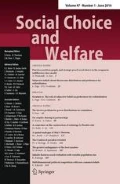1 Correction to: Social Choice and Welfare https://doi.org/10.1007/s00355-021-01372-5
The production team incorrectly processed the author names in the reference list by mistake in the original publication of the article. The corrected reference list is given below:
References
Ahn DS, Oliveros S (2014) The Condorcet jur(ies) theorem. J Econ Theory 150:841–851
Boland PJ (1989) Majority systems and the Condorcet Jury Theorem. J R Stat Soc Ser D (Stat) 38(3):181–189
Bonnefon J-F (2010) Behavioral evidence for framing effects in the resolution of the doctrinal paradox. Soc Choice Welf 34(4):631–641
Bovens L, Rabinowicz W (2004) Voting procedures for complex collective decisions: an epistemic perspective. Ratio Juris 17(2):241–258
Bovens L, Rabinowicz W (2006) Democratic answers to complex questions—an epistemic perspective. Synthese 150(1):131–153
Bozbay I (2019) Truth-tracking judgment aggregation over interconnected issues. Soc Choice Welf 53(2):337–370
Camps R, Mora X, Saumell L (2012) A general method for deciding about logically constrained issues. Ann Math Artif Intell 64(1):39–72
Condorcet, MJAN Caritat de (1785) Essai sur l’application de l'analyse à la probabilité des decisions rendues à la pluralité des voix. Imprimerie royale, Paris
de Clippel G, Eliaz K (2015) Premise-based versus outcome-based information aggregation. Games Econ Behav 89:34–42
Dietrich F (2007) A generalised model of judgment aggregation. Soc Choice Welf 28(4):529–565
Dietrich F (2014) Scoring rules for judgment aggregation. Soc Choice Welf 42(4):873–911
Dietrich F, List C (2004) A model of jury decisions where all jurors have the same evidence. Synthese 142(2):175–202
Dietrich F, List C (2007) Arrow’s theorem in judgment aggregation. Soc Choice Welf 29(1):19–33
Dietrich F, List C (2007) Strategy-proof judgment aggregation. Econ Philos 23(3):269–300
Dietrich F, Spiekermann K (2013) Epistemic democracy with defensible premises. Econ Philos 29(1):87–120
Dietrich F, Spiekermann K (2013) Independent opinions? On the causal foundations of belief formation and jury theorems. Mind 122(487):655–685
Egan JP (1975) Signal detection theory and ROC-analysis. Academic Press
Fawcett T (2006) An introduction to ROC analysis. Pattern Recogn Lett 27(8):861–874
Hand DJ, Till RJ (2001) A simple generalisation of the area under the ROC curve for multiple class classification problems. Mach Learn 45(2):171–186
Karotkin D, Paroush J (2003) Optimum committee size: quality-versus-quantity dilemma. Soc Choice Welf 20(3):429–441
Kornhauser LA (1992) Modeling collegial courts I: path-dependence. Int Rev Law Econ 12(2):169–185
Kornhauser LA, Sager LG (1993) The one and the many: adjudication in collegial courts. Calif Law Rev 81(1)
Ladha KK (1992) The Condorcet jury theorem, free speech, and correlated voters. Am J Polit Sci 36:617–634
Ladha KK (1993) Condorcet’s jury theorem in light of de Finetti’s theorem. Soc Choice Welf 10(1):69–85
Ladha KK (1995) Information pooling through majority-rule voting: Condorcet’s jury theorem with correlated votes. J Econ Behav Org 26(3):353–372
List C (2005) The probability of inconsistencies in complex collective decisions. Soc Choice Welf 24(1):3–32
List C (2006) The discursive dilemma and public reason. Ethics 116(2):362–402
List C (2012) The theory of judgment aggregation: an introductory review. Synthese 187(1):179–207
List C, Pettit P (2002) Aggregating sets of judgments: an impossibility result. Econ Philos 18(1):89–110
List C, Puppe C (2009) Judgment aggregation: a survey. In: Anand P, Pattanaik P K, Puppe C (eds), Handbook of rational and social choice, Oxford University Press, Oxford
Nehring K, Pivato M (2011) Incoherent majorities: the McGarvey problem in judgement aggregation. Discret Appl Math 159(15):1488–1507
Peleg B, Zamir S (2012) Extending the Condorcet jury theorem to a general dependent jury. Soc Choice Welf 39(1):91–125
Pivato M (2017) Epistemic democracy with correlated voters. J Math Econ 72:51–69
Sapir L (1998) The optimality of the expert and majority rules under exponentially distributed competence. Theor Decis 45(1):19–36
Terzopoulou Z, Endriss U (2019) Optimal truth-tracking rules for the aggregation of incomplete judgments. In: Proceedings of the 12th International Symposium on Algorithmic Game Theory (SAGT-2019)
Terzopoulou Z, Endriss U (2019) Strategyproof judgment aggregation under partial information. Soc Choice Welf 53(3):415–442
The original article has been corrected.
Author information
Authors and Affiliations
Corresponding author
Additional information
Publisher's Note
Springer Nature remains neutral with regard to jurisdictional claims in published maps and institutional affiliations.
Rights and permissions
Open Access This article is licensed under a Creative Commons Attribution 4.0 International License, which permits use, sharing, adaptation, distribution and reproduction in any medium or format, as long as you give appropriate credit to the original author(s) and the source, provide a link to the Creative Commons licence, and indicate if changes were made. The images or other third party material in this article are included in the article's Creative Commons licence, unless indicated otherwise in a credit line to the material. If material is not included in the article's Creative Commons licence and your intended use is not permitted by statutory regulation or exceeds the permitted use, you will need to obtain permission directly from the copyright holder. To view a copy of this licence, visit http://creativecommons.org/licenses/by/4.0/.
About this article
Cite this article
Alabert, A., Farré, M. Correction to: The doctrinal paradox: comparison of decision rules in a probabilistic framework. Soc Choice Welf 58, 897–899 (2022). https://doi.org/10.1007/s00355-021-01380-5
Published:
Issue Date:
DOI: https://doi.org/10.1007/s00355-021-01380-5

